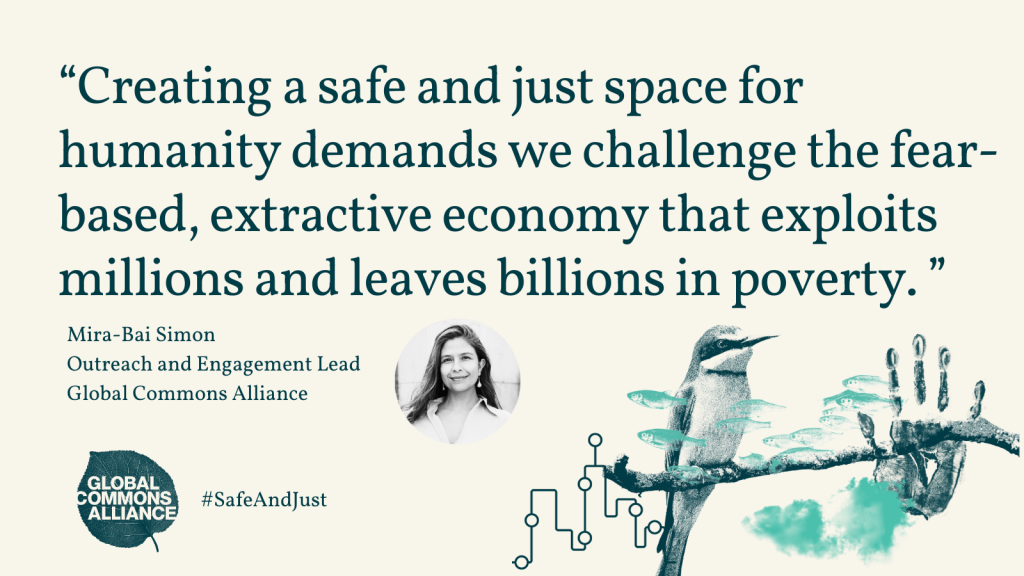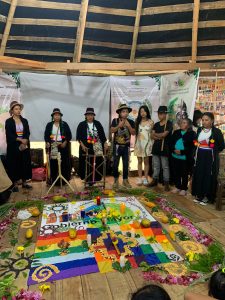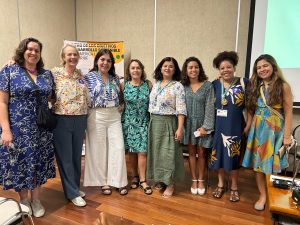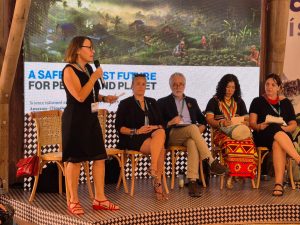By Mira-Bai Simon, Outreach and Engagement Lead for the Global Commons Alliance
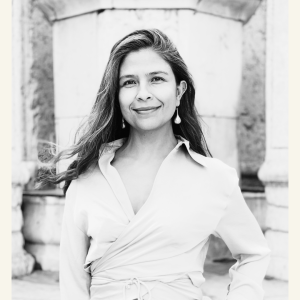
When I became the Outreach and Engagement Lead for the Global Commons Alliance, I embarked on a transformative journey that opened my heart, challenged my assumptions, and taught me the courage required to listen—truly listen—to the Earth and its people.
Leading the assessment of our first granting initiative uncovered stories of resilience and revelation, but it was the act of dismantling imposed narratives and fostering inclusive diversity that showed me how to co-create a just future. My first task was to conduct a comprehensive assessment of grants we’d received to expand our work beyond North America and Europe, and prioritize other regions and cultures in order to advance justice, equity, and diversity. This wasn’t just about numbers—it was about unearthing stories of those unfairly excluded by hegemonic narratives, like “progress,” which often masks exploitation.
Assessing Inclusive Impact
I immersed myself in proposals, interviewed project leads, and designed a tailored questionnaire to extract raw insights. The process stirred tension—some viewed it as overly probing, questioning trust. Without a monitoring system, however, this assessment was essential to refine our processes and foster cohesive collaboration. The results were remarkable: the grants had ignited community-led solutions, revealing both achievements and challenges in a short period.
One project partnered with Mongabay to support Indigenous journalism. Their investigative report on illegal gold mining along the Cenepa River, on the Peru-Ecuador border, exposed environmental devastation and prompted action. Local Indigenous leaders informed Mongabay that the army and police used the report’s photos and videos to conduct raids, destroying hundreds of pieces of illegal mining equipment.
The Global Commons Alliance Accountability Accelerator, collaborating with partners EarthRights International, has supported impactful projects that uplift marginalized communities and hold corporations accountable for environmental and human rights violations. In the Democratic Republic of Congo, the report “Beneath the Green: A critical look at the cost of industrial cobalt mining in the DRC,” by RAID and AFREWATCH, exposed toxic pollution from cobalt mining in Kolwezi, affecting over 500,000 residents with water contamination, health issues, and human rights abuses, challenging the industry’s “sustainable” claims.
In Mexico, ProDESC, with the Global Alliance Accountability Accelerator support, secured the cancellation of Électricité de France’s Gunaa Sicarú wind park in Unión Hidalgo, Oaxaca, using a human rights-based legal model now sought for replication in Brazil, Chile, and Cameroon.
Inclusive Diversity as a Living Commitment
Since 2021, the Alliance has embraced justice, equity, and inclusive diversity as a living process, weaving these principles into our core strategy to create a truly global narrative.
We’ve diversified our teams, mapped Amazon stakeholders, and monitored mining in the Congo Basin. I curated partnerships with Southern organizations, strengthening ties with the Planetary Health Alliance and the Global Alliance for the Rights of Nature.
With the Planetary Health Alliance, we crafted cross-narratives and proposed joint advocacy at CBD COP 16, connecting with new Indigenous groups in Latin America. We also brought Natalia Greene, CEO of the Global Alliance for the Rights of Nature, to the Villars Summit, where she joined an all-woman panel to bridge the science-policy gap, grounding our work in Indigenous cosmovisions. The inclusion of Tan Sri Dr. Jemilah Mahmood, Executive Director of Sunway Center for Planetary Health, on our Steering Committee further diversified our perspectives, amplifying the global majority’s voice.
A landmark achievement was commissioning the Mekon Ecology study on Earth System Boundaries in the Pantanal. This report operationalizes science into local action, integrating justice, equity, and diversity to foster stakeholder collaboration in Brazil. It’s a model for partnering with organizations to test actionable science.
I organized the Alliance’s first learning session among component directors, a space where we shared knowledge and confronted hard truths: misaligned priorities, trust gaps, and projects that faltered. We posed critical questions: How do we measure impact beyond outputs? How do we honor Indigenous wisdom without tokenizing it? Are we challenging frameworks designed by Western scientists to include broader perspectives?
A New Lens: Indigenous Wisdom and Vulnerable Listening
Attending Indigenous gatherings and meeting Natalia Greene reshaped my perspective. Elders spoke for hours, weaving narratives of Earth, her minerals, her bones, as our mother. Unlike the rushed pace of CBD COP 16, these circles demanded patience—a call to listen differently. To them, the “carbon economy” feels like betrayal, perpetuating a progress narrative that exploits billions. With 1.1 billion people living in multidimensional poverty, subsidizing wealthy lifestyles, true diversity requires empathy beyond our circles. I learned how slow, vulnerable listening sparks possibilities, building trust for shared dreams.
Amplifying Voices Globally
I supported my colleagues to strategize for CBD COP 16, supporting an Earth Commission event led by our Chair, Margarita Astralaga. This event explored a “Safe and Just Operating Space” for Indigenous communities, bridging global and local concepts. CBD COP 16 connected us with youth, Indigenous peoples, and international organizations, opening doors for future partnerships. My participation in the SIRGE Coalition’s International Summit on “Just Transition: Indigenous Peoples’ Perspectives” deepened my knowledge on how international indigenous summits are led and the differences in perspectives. Many indigenous communities—who act as guardians for the remaining intact ecosystems on our planet—are still suffering deeply from what they see as continuous colonization.
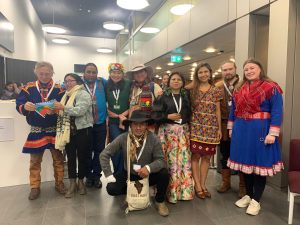
Listening beyond ourselves
Inclusive diversity means listening to others with curiosity, not judgment, resisting the urge to impose our ways. Creating a safe and just space for humanity demands we challenge the fear-based, extractive economy that exploits millions and leaves billions in poverty.
Achieving justice, equity, and inclusion, free from imposed narratives, takes courage—courage to nurture empathy, listen to all voices, and practice patience. Only then can we craft a narrative where society is truly just and fair, for all living our collective story, now and for generations to come.
A Call to the Future
As I conclude my role, I offer these recommendations
- Anchor in lessons: Transform stories into actions that challenge extractive narratives.
- Use words carefully: Move beyond acronyms like JEDI, adopting terms that reflect the depth of inclusive diversity and justice. Replace terms like “Global North” and “Global South,” which many Indigenous peoples find exclusionary, by referring to specific communities or countries where possible.
- Center Indigenous wisdom: Shape narratives to honor diverse cosmovisions and worldviews.
- Diversify decision-making: Invite unconventional voices to reflect those unfairly excluded.
- Expand accessibility: Generate and distribute content in diverse languages to broaden reach.
- Listen with courage: Foster safe spaces for vulnerability, staying open to hard truths and ancient wisdom.
The Global Commons Alliance has made a remarkable effort to embed justice, equity, diversity, and inclusion in its initiatives, creating a foundation for meaningful change. Despite future challenges, I trust colleagues will continue this journey with the courage to listen, evolve, and invest resources in fostering diverse inclusivity and a fair approach to safeguard a just future for all.
